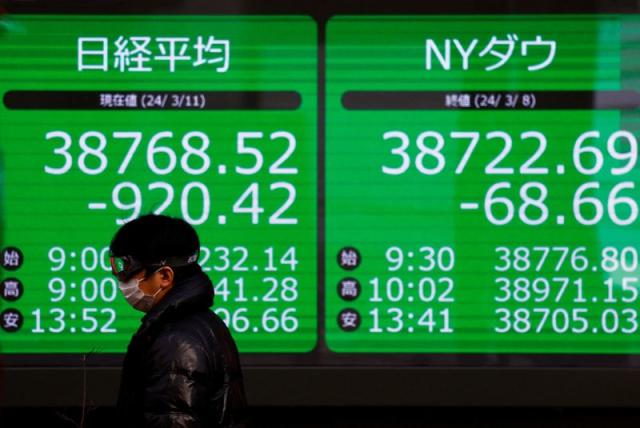Global shares dipped on Tuesday while the yen slid after the Bank of Japan met market expectations and ended eight years of negative interest rates, likely the highlight of a busy week for central banks.
MSCI's world share index (.MIWD00000PUS), opens new tab dropped 0.16%, though was still around all-time highs, and the U.S benchmark 10 year Treasury yield was around 2 basis points (bps) lower at 4.324%.
But the day's big news was in Japan, where the BOJ heralded a new era as it shifted away from years of ultra-easy monetary policy. It also abandoned bond yield curve control and dropped purchases of riskier assets, including exchange-traded funds.
Japan's Nikkei (.N225), opens new tab was choppy initially after the decision but closed 0.66% higher, buoyed by the weaker yen, while Japanese government bond yields fell.
Though the move was Japan's first interest rate hike in 17 years, it still keeps its rates stuck around zero as a fragile economic recovery forces the central bank to go slow on further rises in borrowing costs, analysts say, giving the yen little traction.
In a statement announcing its decision, the BOJ said it will keep buying "broadly the same amount" of government bonds as before and ramp up purchases in case yields rise rapidly.
The yen weakened, with the dollar up 1% to 150.64, indicating the landmark pivot had already been priced into markets after weeks of policy clues and media reports that a shift was imminent.
"What would have been quite seismic announcements historically were in the end quite muted, given what had already been leaked to the markets over the last few days. Bond moves were broadly positive as were stock market moves -- the real action was focussed on the currency," said Charles Hepworth, investment director at GAM Investments
Investor focus is now on whether Tuesday's BOJ hike is a one-and-done move or if there is more tightening to come as it may influence the yen's role as a cheap funding currency for carry trades.
BOJ Governor Kazuo Ueda said in his press conference that accommodative financial conditions will be maintained for the time being and the pace of further hikes will depend on the economic and inflation outlooks.
European shares were fairly muted, with the STOXX 600 down a touch (.STOXX), opens new tab and euro zone bond yields edged up. The BOJ ends negative interest rates in a landmark move that puts an end to its decade-long massive stimulus programme. The bank decided to guide it in a range of 0-0.1% partly by paying 0.1% interest to deposits at the central bank.
The BOJ ends negative interest rates in a landmark move that puts an end to its decade-long massive stimulus programme. The bank decided to guide it in a range of 0-0.1% partly by paying 0.1% interest to deposits at the central bank.
In the day's other central bank news, the Reserve Bank of Austrlia held interest rates steady as expected, while watering down a tightening bias to just say that it was not ruling anything in or out on policy.
The Australian dollar slipped 0.63% to $0.6519 following the decision. The Aussie is down over 4% against the U.S. dollar this year.
The Federal Reserve's two-day meeting wraps up on Wednesday, and central banks in Britain, Norway, and Switzerland meet Thursday. All are expected to keep rates steady, though markets are not ruling out a move in the Alps.
When it comes to the Fed, the market's attention is on policymakers’ updated economic and interest rate projections and comments from Chair Jerome Powell.
Last week's stronger than expected inflation reports led traders to reduce their bets on rate cuts this year, with markets now pricing in 71 bps of easing in 2024. At the start of the year, traders were pricing in 150 bps of cuts.
Traders are pricing in a 54.7% chance of the Fed starting its easing cycle in June, the CME FedWatch tool showed, sharply lower than earlier expectations.
Erik Weisman, chief economist and portfolio manager at MFS Investment Management, said a lot will be riding on the next inflation report due next month, where "another strong print would likely call into question Fed cuts this year, while a lower figure will probably put a June cut firmly back on the table."
In commodities, spot gold eased to $2,155.60 an ounce. U.S. crude fell 0.18% to $82.57 per barrel and Brent was at $86.74, down 0.17% on the day.











